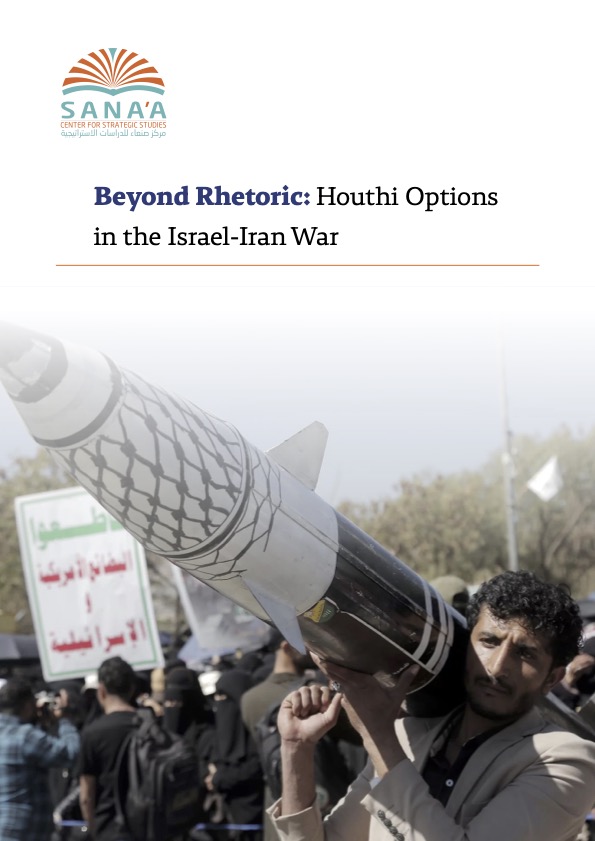The rapid escalation between Israel and Iran in recent days threatens to reshape regional dynamics while exposing the limits of the Houthi group (Ansar Allah) as a reliable pressure tool for Tehran.
Before Israel attacked Iran in the early hours of Friday morning, the Houthis had positioned themselves as Israel’s most active threat. In response to Israeli retaliatory strikes in Yemen, the Houthis warned that no site in Israel would be completely safe, announcing that they are testing new missiles capable of causing greater damage to Israel, and going as far as urging diplomatic missions in Israel to evacuate and communicate with the “Yemeni Armed Forces” to ensure their safety. Domestically, the Houthis continue to claim victory in the Red Sea, saying they forced the United States to halt its own airstrikes by imposing costs on the US and Western naval assets.
Israel’s attack on Iran now undermines this narrative. In a matter of days, Iran has lost its leading nuclear scientists, a dozen senior commanders, and suffered precision strikes on nuclear and oil facilities, including ones close to the Supreme Leader’s residence. The strikes have pushed Tehran to respond directly, moving away from the proxy warfare that has characterized their approach to date. While the Houthis remain active, claiming to have launched various missiles toward Israel alongside Iran’s own salvos, the contrast is stark: Iran has so far deployed dozens of advanced missiles, while the Houthis have thus far undertaken what appear to be merely symbolic launches, firing a “number of “Palestine 2” missiles.”
The Houthis have only just emerged from an intense US-led aerial campaign, which came to an end in May. Operation Rough Rider killed hundreds of Houthi fighters, including their top missile expert and other commanders. The campaign revealed that even senior Houthi leaders are not safe. Although it has been widely reported that Israel recently targeted the Houthi Chief of Staff in Sana’a — Mohammed Abdelkarim al-Ghamari— it remains to be seen how much information Israeli and US intelligence agencies have on the Houthis compared to Iran or Hezbollah. Israel’s attacks on Iran are likely to impose significant setbacks on the Houthis – the fight keeps Iran busy and makes it harder for them to send weapons and aid abroad. At the same time, the image the Houthis have tried to build — that they are Israel’s main enemy — is now less convincing. Whether this will erode their domestic grip in the near term, however, is questionable.
What the Houthis Might Do Next
Looking ahead, the Houthis are likely to persist with attacks on Israel to sustain their claim to be a frontline resistance force defending Palestine — a role they have cultivated since October 7 – and the Arab and Muslim community in general. They will likely continue to frame these attacks as part of broader efforts to lift the siege on Gaza, but with a greater emphasis on coordination with Iran. Recent statements, including Abdelmalek al-Houthi’s defiant pledge that Yemen is a full partner of Iran “in position and stance, and in all that we can do,” indicate a shift toward open, unconditional alignment with Tehran. This underscores both a desire to cement their standing within Iran’s Axis of Resistance while concealing underlying concerns: if Iran’s regime were to weaken or collapse, the Houthis could find themselves isolated.
Should the conflict escalate to an irreversible phase, potentially involving the United States, the Houthis have alluded to again disrupting shipping in the Bab al-Mandab Strait, possibly coordinating with Iran and its own threat to shut down the Strait of Hormuz. This could range from harassing commercial vessels to threatening or targeting US naval assets. Taking note of what happened to the Iranians, who have accused Washington of duplicity for having foreknowledge of the attacks and materially supporting them despite the ongoing nuclear talks, the Houthis could also reassess their de-escalation agreement with the US. Simultaneously, they will tighten security around senior leadership and fortify domestic frontlines to hedge against further strikes.
Saudi Arabia, meanwhile, has moved swiftly to contain the regional fallout. Riyadh was among the first countries to condemn Israel’s strikes on Iran, with Crown Prince Mohammed bin Salman personally calling the Iranian president to convey Saudi Arabia’s condemnation of the attack, signalling the kingdom’s commitment to managing tensions and maintaining the trajectory of rapprochement. Such cautious diplomacy suggests that Riyadh may aim to prevent Iran from retaliating against US interests in the Gulf, including inside Saudi territory, and to avoid being drawn in. For Yemen, this likely means that Saudi Arabia will restrain the government from issuing bellicose statements or speculating about renewed ground offensives against the Houthis, unlike the more aggressive posturing during Operation Rough Rider.
So far, Israel’s escalation against Iran has shown the limits of Houthi deterrence in the face of Israeli military might. Iran is currently fighting back basically alone. This does not mean the Houthis are out of the equation, but they have a limited capacity for militarily shifting the conflict in Iran’s favor. Despite their scaling back of maritime attacks, the Houthis still possess the ability to disrupt shipping if Iran chooses to expand the scope of the confrontation. The Houthi role may be secondary for now, but they remain an option for coordinated action if the conflict escalates.
This analysis is part of a series of publications produced by the Sana’a Center and funded by the government of the Kingdom of the Netherlands. The series explores issues within economic, political, and environmental themes, aiming to inform discussion and policymaking related to Yemen that foster sustainable peace. Any views expressed within should not be construed as representing the Sana’a Center or the Dutch government.

 اقرأ المحتوى باللغة العربية
اقرأ المحتوى باللغة العربية
